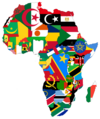African Virtual University
The African Virtual University (AVU) is a pan-African effort to create an open and affordable distance learning institution to serve the African continent. The AVU began in 1997 as a project of the World Bank and later developed into an autonomous institution after it was handed over to African governments in 2003.[1][2][3] Over the program's lifetime, critics have questioned its efficacy as well as its neocolonial aspects.
Reasons for creation[edit]
Sub-Saharan Africa is a region that has experienced high rates of HIV/AIDs, political instability, and poverty.[4] These conditions have contributed to a paucity of state-run educational institutions, an insufficient number of educators, and a surplus of students.[4] For these reasons, many students attend universities outside of SSA which has drained the region of its educated residents[5] Specifically, the AVU was designed to expand the capacity of SSA institutions of higher learning to service a larger number of students.[6] The UVA hoped that these additional spaces would lower the cost of education to more affordable levels.[6] Furthermore, the AVU initiative desired to equip SSA students with the skills they would need to compete in the new professional jobs emerging on the continent—especially in the technical industries.[6] The initiative hoped that the AVU could provide access to academic databases, high-quality professors, and technical curricula to close the gap between African country's economies and that of the rest of the world.[6]
As of 2013, the program had more than 40,000 graduates in 27 Sub-Saharan countries and planned to expand to phone-based content in 2015 due to the prevalence of smartphones on the continent.[7][8]
Neocolonialism in higher education[edit]
Conditions attached to World Bank loans forced African countries to reduce spending on higher education, since higher education institutions paid lower dividends than elementary and secondary education programs.[9] These conditions decreased the quality of education provided by African universities. Additionally, the World Bank also introduced their own more expensive alternative programs taught by western professors.[9] These programs, especially regarding historical, cultural, and humanities-related content raised concerns about the interpretations being provided by western scholars.[9] The origins of many African universities harkens back to western influence as well.[10] Modern western schools have reinforced this legacy of dependency through AVU's western partner universities who provide the program's content.[10] This flow of knowledge moves in a one-way direction from the West to the East, leaving African countries with little say in the curriculum.[10]
References[edit]
- ^ Kyama, Reuben. "African Virtual University makes an actual impact". universityworldnews.com. Retrieved 14 February 2014.
- ^ "AfDB and African Virtual University discuss benefits of e-learning". afdb.org. Retrieved 14 February 2014.
- ^ Light, David A. (1999-09-01). "Pioneering Distance Education in Africa". Harvard Business Review. ISSN 0017-8012. Retrieved 2022-12-21.
- ^ a b Simmons et al. 2011, p. 78.
- ^ Simmons et al. 2011, p. 79.
- ^ a b c d Simmons et al. 2011, pp. 82–83.
- ^ "African Virtual University: Transforming Africa into a Global Knowledge Hub". African Development Bank (in French). 2019-03-14. Retrieved 2022-12-21.
- ^ Anderson, Mark (2015-05-20). "Out of Africa: e-learning makes further education a reality for tens of thousands". Retrieved 2022-12-21.
- ^ a b c M. Nafukho, Fredrick; Helen Muyia, Machuma (2013-08-23). "The World Bank ' s Africa Virtual University Project: a revisit". European Journal of Training and Development. 37 (7): 646–661. doi:10.1108/ejtd-02-2013-0020. ISSN 2046-9012.
- ^ a b c Munene, Ishmael I. (January 2007). "Experimenting in distance education: The African virtual university (AVU) and the paradox of the World Bank in Kenya—A rejoinder". International Journal of Educational Development. 27 (1): 77–85. doi:10.1016/j.ijedudev.2006.05.002. ISSN 0738-0593.
Further reading[edit]
- Simmons, L.L.; Mbarika, I.; Mbarika, V.W.; Thomas, C.A.; Tsuma, C.; Wade, T.L.; Wilkerson, D. (2011). "TeleEducation initiatives for sub-saharan africa: The case of the african virtual university in kenya". Journal of STEM Education: Innovations and Research. 12.

